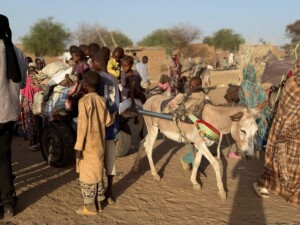Economist: ‘US Dollar could soon cost more than 1,000 Sudanese Pounds’
As the value of the Sudanese Pound (SDG) continues its unprecedented downward spiral against the US Dollar and other major international currencies, a prominent economic analyst has predicted that the price for a greenback could rise above SDG1,000.
 Informal forex traders in Khartoum (File photo)
Informal forex traders in Khartoum (File photo)
As the value of the Sudanese Pound (SDG) continues its unprecedented downward spiral against the US Dollar and other major international currencies, a prominent economic analyst has predicted that the price for a greenback could rise above SDG1,000.
As reported by Radio Dabanga, on Sunday morning, a Dollar cost SDG672 at the official bank rate – SDG12 more than it did on Thursday last week – while the greenback was trading at SDG640 on the parallel market – up SDG 20 from the end of last week.
The resulting sharp rise in prices of consumer and essential goods, has made the lives of the Sudanese people “a living hell”.
In an interview with Radio Dabanga, economic analyst Kamal Karrar predicts that the price of a US dollar will rise to exceed more than SDG1,000 in the coming period, which might lead to a comprehensive stagnation and depression. This will mean that the public will be unable to afford the existing goods.
He said that there is now a continuous rise in the price of the dollar and other currencies resulting from the race between banks and the parallel market to determining the price of the Pound. “It is a race between a tortoise and a hare, because there are greater possibilities for the parallel market.
Karrar predicts that simple industries, even local ones, might have to stop if the depreciation of the Sudanese Pound makes it impossible to purchase raw materials from abroad.
He asserts that the reason for the collapse is the lack of state control over resources and export commodities, that could return in hard currency to the Bank of Sudan to finance the basics such as food, medicine, and fuel.
“What is happening now is an economic collapse as a result of the IMF and World Bank policies to expel the state from the foreign trade market and the currency market, as well as the decision to float the Sudanese Pound and leave determining its value to street market traders.”
Karrar concludes: “There is no possibility of reforming the economy and there is no hope for reform through normal means, without an agreed-upon political programme. Ousting the coup junta is the way to address the economic situation.”











 and then
and then